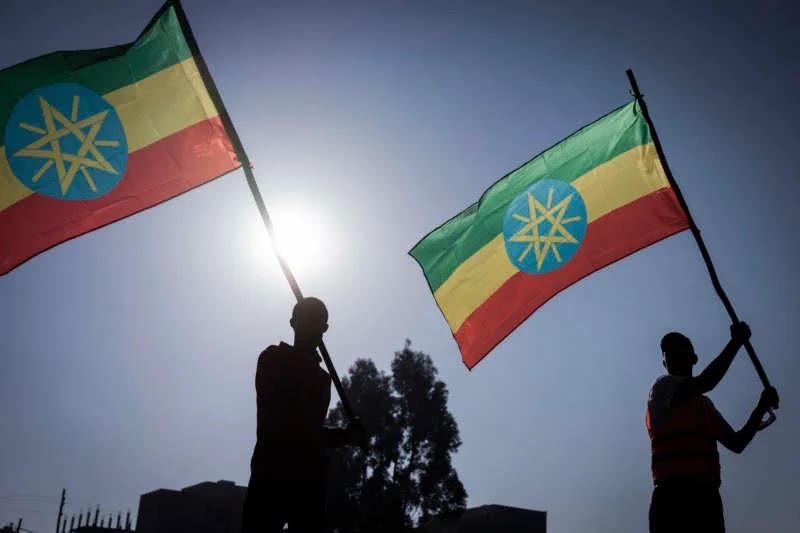In northern Ethiopia, fighting broke out on Wednesday between government forces and Tigrayan rebels, breaking a five-month truce and undermining peace attempts.
The announcement that Ethiopia’s air force had shot down a plane carrying weapons for the Tigray People’s Liberation Front came after reports of new offensives (TPLF).
Both the rebels and the government of Prime Minister Abiy Ahmed have traded accusations of hindering efforts to end the deadly 21-month war in the continent’s second-most populous country. They also have traded accusations over who was to blame for the rebels’ decision to re-enter battle.
An “urgent suspension of hostilities and for the restart of peace talks,” Antonio Guterres, the head of the UN, pleaded, saying he was “very horrified” by the resumed bloodshed.
The head of the African Union Commission, Moussa Faki Mahamat, called for a “de-escalation” and the resumption of “talks to seek a peaceful solution.”
The United States urged both sides “to redouble efforts to advance talks to achieve a durable ceasefire,” a US State Department spokesman said.
The TPLF said government forces and their allies had launched a “large scale” offensive towards southern Tigray early Wednesday after a months-long lull in fighting.
But the government accused the TPLF of striking first and violating the ceasefire.
“Ignoring all of the peace alternatives presented by the government, the terrorist group TPLF armed group continued its recent provocations and launched an attack this morning at 5 am (0200 GMT)” around southern Tigray, the Government Communication Service said in a statement.
The rival claims could not be independently verified as access to northern Ethiopia is restricted. Still, there were reports of fighting around southern Tigray bordering the Amhara and Afar regions.
“They launched the offensive early this morning around 5 am local time. We are defending our positions,” TPLF spokesman Getachew Reda told AFP.
He said on Twitter that the “large-scale” offensive was launched “against our positions in the southern front” by the Ethiopian army, special forces, and militias from neighboring Amhara.
‘Violated our airspace.’
The air force said Wednesday it had shot down a plane “believed to be a property of historical enemies who want Ethiopia’s weakness.”“The airplane which violated our airspace from Sudan… and aimed to supply weapons to the terror group was shot down by our heroic air force,” the Ethiopian News Agency quoted armed forces spokesman Major General Tesfaye Ayalew as saying.
The date of the incident, the type of aircraft, and how it was downed were not detailed.
The TPLF said it was a “blatant lie.”
The March truce had paused fighting in a war that first began in November 2020, allowing a resumption of some international aid to Tigray after a three-month break.
Both sides in recent weeks had evoked possible peace talks.
But they disagree on who should lead negotiations, and the TPLF also insists basic services must be restored to Tigray’s six million people before dialogue can begin.
Abiy’s government says any talks must be brokered by the African Union’s Horn of Africa envoy Olusegun Obasanjo, who is leading the international push for peace. Still, the rebels want outgoing Kenyan President Uhuru Kenyatta to mediate.
In a statement dated August 23, TPLF leader Debretsion Gebremichael said “two rounds of confidential face-to-face” meetings with top civilian and military officials had taken place, the first acknowledgment by either side of direct talks.
No time or place was given for these talks, which the government has not confirmed.
William Davison, senior Ethiopia analyst for the International Crisis Group (ICG) think tank, urged all parties to cease fighting to avert “a return to full-blown war.”
“This serious breach of the truce agreed earlier this year demonstrates the need for the two parties to arrange unconditional face-to-face negotiations as soon as these hostilities cease,” Davison said in a statement.
‘Enough of this war.’
“I was shocked when I heard the news this morning. We had hoped they were ready for peace, but now our hope is gone,” said Addis Ababa resident Teklehaimanot Mezgebu.“If they start the war, that will not be good for the people of Ethiopia and Tigray.”
The conflict has killed untold numbers, with widespread reports of atrocities, including mass killings and sexual violence.
Millions of people need humanitarian assistance in Tigray, the country’s northernmost region, and Afar and Amhara.
The UN’s World Food Programme said last week that nearly half the population in Tigray is suffering from a severe lack of food, and malnutrition rates had “skyrocketed.”
Tigray is largely cut off from the rest of Ethiopia, without basic services such as electricity, communications, and banking.
Abiy sent troops into Tigray in November 2020 to topple the TPLF after months of tensions with the party that had dominated Ethiopian politics for three decades.
The 2019 Nobel Peace Prize winner said the move came in response to rebel attacks on army camps.
The TPLF mounted a comeback, recapturing Tigray and expanding into Afar and Amhara before the war reached a stalemate.
Last Wednesday, an Ethiopian government committee tasked with looking into negotiations called for a formal ceasefire as part of a proposal it planned to submit to the AU.



